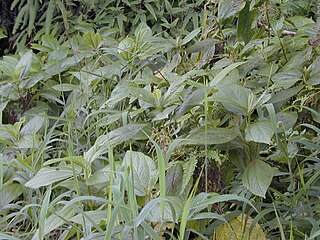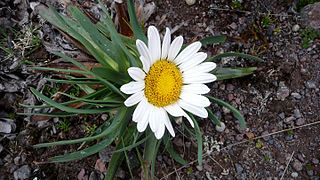
Calamagrostis is a genus of flowering plants in the grass family Poaceae, with about 260 species that occur mainly in temperate regions of the globe. Towards equatorial latitudes, species of Calamagrostis generally occur at higher elevations. These tufted perennials usually have hairless narrow leaves. The ligules are usually blunt. The inflorescence forms a panicle. Some may be reed-like.

Boehmeria is a genus of 47 species of flowering plants in the nettle family Urticaceae. Of the species, 33 are indigenous to the Old World and 14 to the New World; no species is indigenous to both the Old and New Worlds. The species include herbaceous perennials, shrubs and small trees. Although related to the similar-looking species of the stinging nettles of genus Urtica, species of Boehmeria do not have stinging hairs. Because of the similarity in appearance, some species are commonly called "false nettles".

Draba is a large genus of flowering plants in the family Brassicaceae, commonly known as whitlow-grasses.

Mutisia is a genus of flowering plant in the tribe Mutisieae within the family Asteraceae. Mutisia has been named after José Celestino Mutis. It comprises about sixty species which can be found along the entire length of the Andes and in southern Brazil, Paraguay, Uruguay and northern Argentina.

Ladenbergia is a genus of plant in the family Rubiaceae.

Laportea is a genus of plants in the family Urticaceae. They are herbaceous, either annual or perennial. Like many plants of the Urticaceae, they have stinging hairs. There are stinging and non-stinging hairs on the same plant. The genus was named after the French naturalist Francis de Laporte de Castelnau.

Espeletia, commonly known as 'frailejones', is a genus of perennial subshrubs, in the family Asteraceae. The genus, which is native mainly to Colombia, Venezuela and Ecuador, was first formally described in 1808. The genus was named after the viceroy of New Granada, José Manuel de Ezpeleta.

Werneria is a genus of South American plants in the groundsel tribe within the sunflower family.
Hinterhubera is a genus of flowering plants in the family Asteraceae.

Lucilia is a genus of South American flowering plants in the tribe Gnaphalieae within the family Asteraceae.
Mniodes is a genus of South American flowering plants in the tribe Gnaphalieae within the family Asteraceae.
Maoutia is a genus of shrubs or small trees in the nettle family (Urticaceae).

Podostemum is a genus of plants in the family Podostemaceae. It is an aquatic plant with threadlike roots that attaches to rocks.
Castelnavia is a genus of flowering plants belonging to the family Podostemaceae.
Cypholophus is a genus of flowering plants belonging to the family Urticaceae.
Hemistylus is a genus of flowering plants belonging to the family Urticaceae.
Leucosyke is a genus of flowering plants belonging to the family Urticaceae.
Phenax is a genus of flowering plants belonging to the family Urticaceae.
Pimentelia is a genus of flowering plants belonging to the family Rubiaceae.

Rhyncholacis is a genus of flowering plants belonging to the family Podostemaceae.










